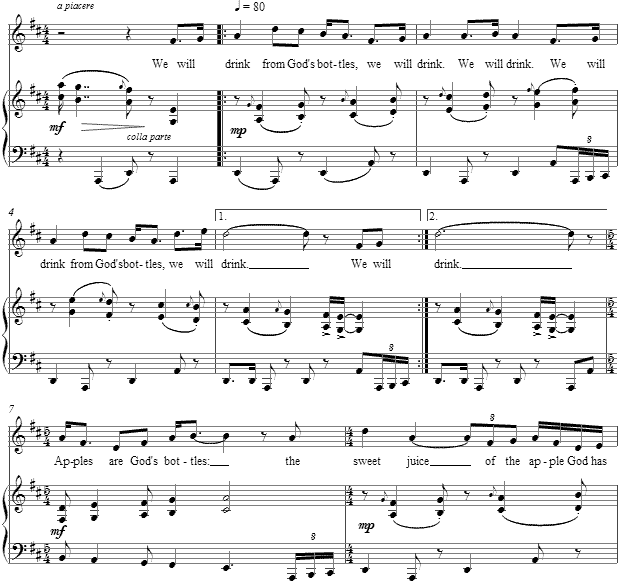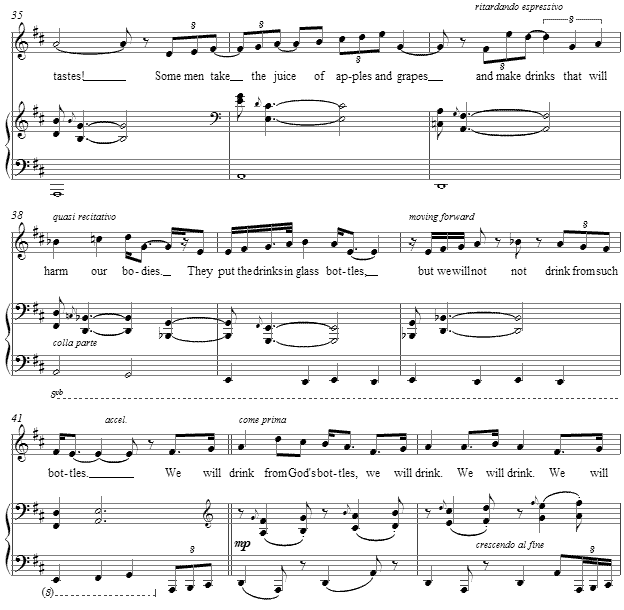Music and Texts of GARY BACHLUND
Vocal Music | Piano | Organ | Chamber Music | Orchestral | Articles and Commentary | Poems and Stories | Miscellany | FAQs
God's Bottles - (2005)
Leaflet Issued by the National Women's Christian Temperance Union (n. d.)
for medium voice and piano
We will drink from God's bottles.
Apples are God's bottles: the sweet juice of the apple
God has placed in His own bottle.
What a beautiful rosy-red bottle it is!
These red bottles hang on the limbs of a tree
until they are all ready for us to use.
Do you want to open God's bottle?
Bite the apple with your teeth,
and you will taste the sweet juice
God has put in His bottle for you.
Grapes are God's bottles: these purple and green bottles
you will find hanging on a pretty vine.
See! So many little bottles are on a single stem!
Put a grape in your mouth and you will open God's bottle.
How nice the juice tastes!
Some men take the juice of apples and grapes
and make drinks, that will harm our bodies.
They put the drinks in glass bottles,
but we will not drink from such bottles.
We will drink from God's bottles.
[ 4 pages, circa 2' 40" ]
Temperance texts like these were written to convince the public during America's Prohibition era not to drink wine, hard cider and liquor. The text was called to my attention by my wife, who had sung an amusing setting for women's chorus by Randall Thompson during her university days. I too was amused by the text itself and wrote this the next day, an amusing bit of fluff.
The temperance movement is alive today, and finds itself stealthily transmuted into high-minded therapeutic strategies to restrict substances deemed "abused" and "unhealthy" through massive advertising, excessive taxation and restrictive regulations. MADD -- or Mother's Against Drunk Driving -- is one such nationally prominent group, though the real opposition to the swift punishment of drunk drivers comes not from brewers and vintners, so much as from those other therapeutic voices within the political spectrum which speak against punishing public intoxication and drunk driving, in favor of therapy along the model of addiction-as-illness in distinct opposition to the notion of behavior-generating-consequences. The socio-political problem will always be one of free will versus coercion, and where one draws the political and legal line between freedom and constraint.
Ironically, a tale from Los Angeles serves to illustrate. Several decades ago, the local politicians decided that impounding the vehicles of intoxicated drivers was a non-jail sort of punishment which might both stem driving while intoxicated and appease the prohibition enthusiasts clothing their argument in arguments which conveniently side-stepped the notion of prohibition, already attempted in the early twentieth century with disastrous results. After a relative or two of the politicians then in power were caught up in this vehicle impound process, the laws were conveniently reset to not have that embarrassment again occur -- to them and their families.
Where, then, is the legal line to be drawn between temperance and therapy, on the one hand, and prosecution and punishment, on the other? After a century's experiments in law and politics, the answer remains unsettled and "fluid."
The setting is meant to echo that small, amateur brass band that often accompanied missionary practices in public. One might imagine the addition of a bass drum and cymbal for the on- and off-beat simple rhythm of the piano accompaniment, the style of which had been adapted from the buskers in service to the aims of proselytism.
As in any frightening tale, perhaps a fairy tale with goblins or a religious story about demons, there must be a demon for such storytelling to acquire its persuasive power. The demon herein is a generic version of "demon rum" or "John Barleycorn" which was used to attack a product, namely alcohol-based drink in this case. It is recommended that the performers highlight the portrayal of this demon -- "some men" who "put the drinks in glass bottles" -- with a judicious application of melodrama.
The score to God's Bottles is available as a free PDF download, though any major commercial performance or recording of the work is prohibited without prior arrangement with the composer. The violin part is attached at the end of the file, as a separate score. Click on the graphic below for this piano-vocal score.

